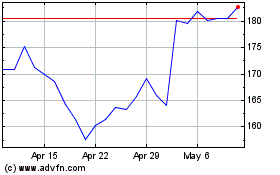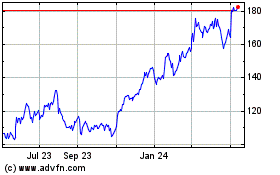By Dana Cimilluca, Dana Mattioli and Ted Greenwald
Broadcom Inc. is nearing a deal to buy software company CA
Technologies for more than $18 billion, according to people
familiar with the matter, a surprise move that would take the
chip-making giant in a new direction.
Broadcom is to pay $44.50 a share for CA, formerly known as
Computer Associates, the people said. Assuming it doesn't fall
apart at the last minute, the deal could be announced later
Wednesday. CA shares closed at $37.21 Wednesday, meaning Broadcom
would pay about a 20% premium.
The takeover would be a major strategic move for Broadcom,
coming just months after its $117 billion-plus hostile bid for
Qualcomm Inc. was blocked by President Donald Trump.
The impending deal took some industry watchers by surprise,
given that it represents expansion into a whole new area for
Broadcom, which has become a semiconductor powerhouse largely
through acquisitions. CA, based in New York, produces software used
in corporate IT infrastructure like mainframe computers.
Broadcom shares, which were down 2.8% in regular trading, fell
another 5.2% after hours after The Wall Street Journal reported on
the deal. The company's market value stood at $108 billion at the
close of trading. Shares of CA, which have risen steadily in recent
years, jumped 16% to $43.10 after hours.
Broadcom walked away from its pursuit of Qualcomm in March after
the U.S. panel that vets foreign deals said that the bid could have
implications for the U.S.'s broader technological competition with
China. That panel, the Committee on Foreign Investment in the U.S.,
or CFIUS, said it was worried that Broadcom would stymie research
and development at Qualcomm given its reputation as a cost-cutting
behemoth. CFIUS said such a move could weaken Qualcomm -- and
thereby the U.S. -- against foreign rivals racing to develop
next-generation wireless technology known as 5G, such as China's
Huawei Technologies Co.
Broadcom, which launched its hostile bid for Qualcomm in
November in what would have been the technology industry's
biggest-ever deal, was working to redomicile in the U.S. from
Singapore to evade the panel's review. But the presidential order
effectively ended its hopes of clinching the deal.
Broadcom completed the move the next month and is now based in
San Jose, Calif. That could improve its odds of avoiding a tough
government review of the CA bid; nonetheless, about 7% of CA's
revenue backlog as of March 31 was with government agencies in the
U.S., according to the software company's last annual report, and
that could become a flash point for regulators.
Qualcomm had resisted Broadcom's advances, arguing among other
things that the company wasn't offering enough. CFIUS's decision to
review Broadcom's proposed bid came just days before Qualcomm
shareholders were set to vote on whether to replace six of the
company's 11 directors with nominees put forward by Broadcom, a
result that could have helped Broadcom achieve the takeover.
Broadcom was known as Avago Technologies Ltd. before Avago
bought Broadcom in 2016 for roughly $37 billion in cash and stock.
Avago went public in 2009 after incorporating in Singapore, which
is known for having a low corporate tax rate.
Broadcom Chief Executive Hock Tan, who took over at the company
in 2006, has earned a reputation as one of the most aggressive and
successful acquirers in the technology industry, even though he
stumbled in his pursuit of Qualcomm. While many technology
companies seek to disrupt or dominate markets by developing new
products, Mr. Tan has purchased established players with leading
products and defensible advantages, and shed operations he picks up
that don't fit these criteria. Since taking over Avago, he went on
a $50 billion shopping spree of a dozen companies and as many
divestitures.
Broadcom makes chips for Wi-Fi, Bluetooth, and GPS connectivity
in smartphones, as well as components for wired networks and data
storage.
The company develops software to support its chips, supplying
layers of code that help engineers write programs for its products.
But software sales aren't a material part of its business,
according to Bernstein analyst Stacy Rasgon.
CA Technologies, on the other hand, sells tools for mainframe
computers, the source of most of its revenue, and for planning,
developing and managing programming projects.
"Mainframe software is sticky and profitable," Mr. Rasgon said.
"But enterprise software is not something Broadcom does, so it's
less clear how CA fits into their portfolio versus prior
acquisitions."
Broadcom's cash flow rose by 58% in fiscal 2017, according to
S&P Global Market Intelligence. The latest takeover bid comes
on the heels of a plan, announced in April, to repurchase $12
billion in shares through the end of the company's 2019 fiscal
year. It has committed to returning to shareholders half of
trailing 12-month free cash flow in the form of dividends, using
the rest for buybacks and acquisitions.
Mr. Tan in Broadcom's most recent earnings conference call said
he was still on the lookout for acquisition targets despite the
buybacks. "We keep doing both," he said. The company's cash flow is
"allowing us a lot more flexibility, which allows us to still look
at M&A."
(END) Dow Jones Newswires
July 11, 2018 18:37 ET (22:37 GMT)
Copyright (c) 2018 Dow Jones & Company, Inc.
QUALCOMM (NASDAQ:QCOM)
Historical Stock Chart
From Mar 2024 to Apr 2024

QUALCOMM (NASDAQ:QCOM)
Historical Stock Chart
From Apr 2023 to Apr 2024
